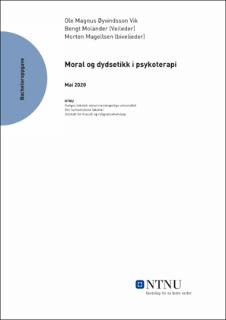| dc.contributor.advisor | Molander, Bengt | |
| dc.contributor.advisor | Magelssen, Morten | |
| dc.contributor.author | Vik, Ole Magnus Øyvindsson | |
| dc.date.accessioned | 2020-06-26T16:00:40Z | |
| dc.date.available | 2020-06-26T16:00:40Z | |
| dc.date.issued | 2020 | |
| dc.identifier.uri | https://hdl.handle.net/11250/2659706 | |
| dc.description.abstract | Psykoterapi er, i tillegg til å være en vitenskapelig fundert praksis, også er en moralsk fundert praksis. Den psykoterapeutiske kontekst er også en arena for kultivering av dyder. Dette kan tenkes å få store konsekvenser for psykoterapeutens rolleforståelse. Dydsetikken, og spesielt den neoaristoteliske dydsetikken har noen fordeler fremfor andre perspektiver, men begrenses av å ikke kunne imøtegå tragiske problemstillinger. "Fronetisk" dydsetikk vektlegger viktigheten av å leve det gode liv gjennom kultivering av dyd (spesielt praktisk visdom) og rommer samtidig det tragiske og er derfor godt egnet som fundament for psykoterapi. Det fins to konkurrerende konseptualiseringer av psykoterapeutisk praksis: En mer teknisk, «medisinsk» tankemåte og en annen som er fundert på det fronetiske perspektivet. Jeg vil og forsøke å sannsynliggjøre at psykoterapi berikes av en tettere interaksjon med moralske spørsmål generelt og at de i større grad bør inkorporeres i psykoterapeutisk praksis og teoriutvikling for å bli en mer epistemisk redelig så vel som effektiv fagdisiplin.
Oppgaven vil også problematisere og diskutere de rådende moralske perspektiver i psykoterapifaget, samt dets operasjonalisering av hva som er god psykoterapeutisk praksis. I den grad psykoterapi beskjeftiger seg med moral synes den å være mest opptatt av demarkasjonsetikk, mens moralske tema innenfor rammene synes å være mindre vektlagt. Dette fremstår som mangelfullt, og jeg vil argumentere for hvorfor psykoterapeutisk praksis er tjent med supplerende fronetiske perspektiver som nettopp søker å belyse problemstillinger på innsiden av rammene. | |
| dc.description.abstract | Psychotherapy is, in addition to beeing a scientifically founded practice also a morally founded practice. The context of psykchotherapy is also an arena for cultivating virtue. This might have great consequences for the role-understanding of the practitioners of psychotherapy. Virtue ethics, especially neoaristotelian virtue ethics has some advantages compared to other perspectives, but is limited by its inability to adress the tragic problem. "Fronetic" virtue ethics highlights the importance of living the good life trough cultivating virtue (first and foremost practical knowledge) while also containing the tragic and is thusly well equipped as an foundation for psychotherapy. There are two competing conceptualizations of psychotherapeutic practice: One more technincal "medical" approach and another that is founded on the fronetic perspective. I will also try to elucidate how psychotherapy will be enriched of a closer interaction with moral questions in general and that they therefore should be incorporated in psychotherapeutic practice and theory development to become a more epistemically sound as well as effective discipline.
This thesis wil also discuss the reigning moral perspectives in the field of psychotherapy, as well as its operationalization of what good psykchotherapeutic practice consists of. To the extent that psychotherapy deals with morality, it seems to be mostly concerned with demarcation ethics, while moral themes within the boundries seems to be less important. This seems lacking and I will argue for how psychotherapeutic practice benefits from supplementary fronetic perspectives that also tries to elucidate problems within the boundries. | |
| dc.publisher | NTNU | |
| dc.title | Moral og dydsetikk i psykoterapi | |
| dc.type | Bachelor thesis | |
